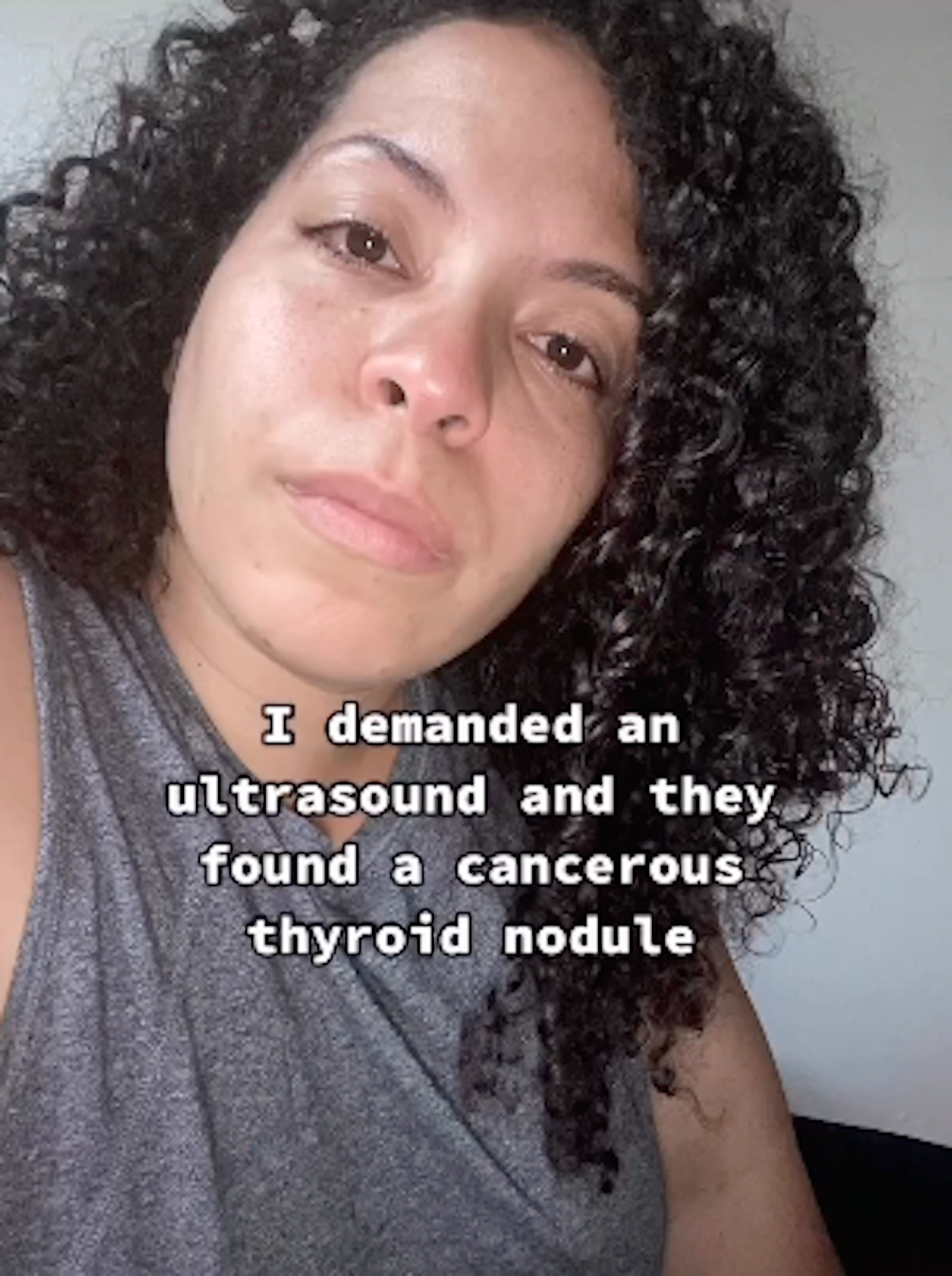Learning About Thyroid Cancer
- Jessica Alexiou, a former fitness coach and professional dancer, was diagnosed with a cancerous thyroid tumor after experiencing symptoms like fatigue, rapid weight gain, and hair loss.
- Thyroid cancer is a disease that begins in the thyroid gland, which is at the base of the neck. The cancer will often present itself as a large bump (tumor) in the neck, and symptoms of thyroid cancer can be mistaken for a common cold.
- Chances of cancer recovery increase significantly with early detection, so it's important to address any new or unusual symptoms you’re experiencing with your doctor promptly.
- Jessica received her diagnosis four years after first experiencing symptoms, highlighting the fact that people often need to advocate for themselves and their health.
- Patients are encouraged to see a second opinion if they feel their concerns aren’t being addressed adequately.
Alexiou is raising awareness for thyroid cancer and encouraging others how important it is to be an advocate for yourself and your health.

Advocating for Your Health
Following a visit to her primary care doctor, she was advised to eat less and increase her exercise, but when that didn’t help she suspected her symptoms to be hormonal. She then went to her obstetrician-gynecologist to have her IUD (an intrauterine device inserted inside the uterus as a form of birth control) removed. Because some IUDs use hormones, she thought this would alleviate her symptoms.
It was then she began feeling “very fatigued,” explaining, “I remember going into work being on like eight to nine hours of really peaceful sleep and still feeling like I couldn’t function in the mornings, like I was exhausted. I’d never experienced anything like that before in my life.”
Alexiou eventually began feeling pain in her neck, only to find a swollen lymph node. After being given antibiotics and steroids, and noticing no improvement, she started to have a ringing in her ear at night.
It wasn’t until she gained approximately 75 pounds and started looking up her symptoms on the internet that she demanded more testing. The tests ultimately showed a thyroid tumor.

“In that moment, l felt so vindicated, because it took so long for me to get answers,” she explained, adding, “This could have been discovered so much sooner had doctors just taken me seriously.”
Alexiou was diagnosed with a cancerous thyroid tumor and hypothyroidism (a condition in which the thyroid doesn’t produce enough hormones) in 2021. This came four years after her symptoms began.
She underwent radiofrequency ablation (RFA), minimally-invasive procedure that reduces the size of thyroid tumors. It left her feeling like herself again and her symptoms disappeared, she told POPSUGAR.
Now that Alexiou has taken control of her health and returned to dancing, as well as working full-time, she has shared her story on Instagram. She revealed she had gained around 90 pounds in total, reaching 235 pounds.
Alongside a video and photo compilation of her journey, Alexiou captioned the post, “For almost 4 years I went undiagnosed/misdiagnosed and ignored by soo many doctors. My blood work was always ‘normal.’
“Deep down I knew something was seriously wrong. I was rapidly gaining weight, and dealt with a laundry list of other symptoms & couldn't continue my coaching or dance career. It wasn't until I had difficulty swallowing that doctors took me seriously. And that wasn't until I demanded the ultrasound.”
Dr. Beth Karlan says, "If You Feel Something, Say Something"
“I thank God for bringing me through to the other side and keeping me sane during it all. For helping me figure it out and showing me the answer. & I thank God for my amazing friends and family who supported me through every phase!” she continued.
“Always always listen to your body and advocate for your health! Don't let any doctor or person tell you it's all in your head.”
Thyroid Cancer Symptoms
Thyroid cancer is a disease that begins in the thyroid gland, which is at the base of the neck. The cancer will often present itself as a large bump (tumor) in the neck. It remains unclear what causes the disease. Some symptoms of thyroid cancer can be mistaken for a common cold.
Dr. Scott Strome, a head and neck cancer surgeon who is currently the dean of the University of Tennessee College of Medicine, and previous chair of head and neck surgery at the University of Maryland School of Medicine, explained thyroid cancer in an earlier interview with SurvivorNet.
“We're now able to detect thyroid disease, thyroid cancers, much earlier than we used to be able to,” Dr. Strome says. “We tend to see it predominantly in younger women, but it can occur in both men and women. In most cases, I tell my patients that, ‘Your thyroid cancer is a barnacle on the ship of life.'”
Dr. Strome suggests finding an experienced thyroid expert for treatment.
“Folks who have thyroid cancer, they need to go to a really experienced thyroid setting and have folks who really understand the disease. Those are for the most indolent type of thyroid cancers, called papillary,” he explained.
“Thyroid cancer is a pretty interesting disease, because papillary is a really indolent cancer. On the other end of the spectrum, you have what's called anaplastic thyroid cancer, which may be one of (if not the) most aggressive cancers that we see. So it's a whole spectrum of disease.”
Treatments for thyroid cancer can include surgery, hormone therapy, radioactive iodine, radiation, and chemotherapy.
Symptoms of thyroid cancer include the following:
- A lump in the neck, sometimes growing quickly
- Swelling in the neck
- Pain in the front of the neck, sometimes going up to the ears
- Hoarseness or other voice changes that do not go away
- Trouble swallowing
- Trouble breathing
- A constant cough that is not due to a cold
“You Are Your Own Best Advocate”
“Most people have no discrete symptoms the majority of cases now are found incidentally,” Dr. Allen Ho said in a previous interview with SurvivorNet.
“However, a sizable number of people may first discover their cancer when they feel a bump on their neck. Other possible late symptoms include problems swallowing, the sensation of something in their throat, neck compression when laying flat or voice changes.”
The good news is that many of these possible symptoms, including lumps in the thyroid, are both common and commonly benign but it never hurts to ask your doctor.
Chances of cancer recovery increase significantly with early detection, so it's important to address any warning signs of thyroid cancer, or any cancer for that matter, with a medical expert swiftly.
Advocating for Yourself
Just as Jessica Alexiou did, it's important to stand up for yourself if you feel that you're being dismissed or mistreated by a doctor. Getting a second opinion is crucial if something doesn't feel right. Luckily, Alexiou received the help she needed.
Be Pushy, Be Your Own Advocate… Don't Settle
Dr. Zuri Murrell, a colorectal surgeon at Cedars-Sinai Medical Center, previously told SurvivorNet that sometimes, patients need to be pushy.
“From a doctor's perspective, every problem should have a diagnosis, a treatment, a plan for follow-up, and a plan for what happens next if the treatment doesn't work,” Dr. Murrell said.
And as a patient, “If you don't feel like each of these four things has been accomplished, just ask! Even if it requires multiple visits or seeing additional providers for a second opinion, always be your own advocate.”
Coping With a Diagnosis
It’s important to remember that coping with a diagnosis like cancer or other illness is not easy and usually brings a string of emotions.
People can feel angry, sad, or determined, and it's completely normal. Sarah Stapleton, a licensed clinical social worker, encourages cancer warriors and their families to be “patient with your emotions.”
“It's also important that you understand how you communicate with your providers, but also with your loved ones,” Stapleton previously told SurvivorNet.
"We can't always assume that people know what we need at a given time, and there are going to be times when you don't want to speak about your diagnosis and you don't want to speak about cancer.”
“Be Patient With Your Emotions”: A Social Worker's Insights Into Handling a Cancer Diagnosis
Contributing: SurvivorNet Staff
Learn more about SurvivorNet's rigorous medical review process.


